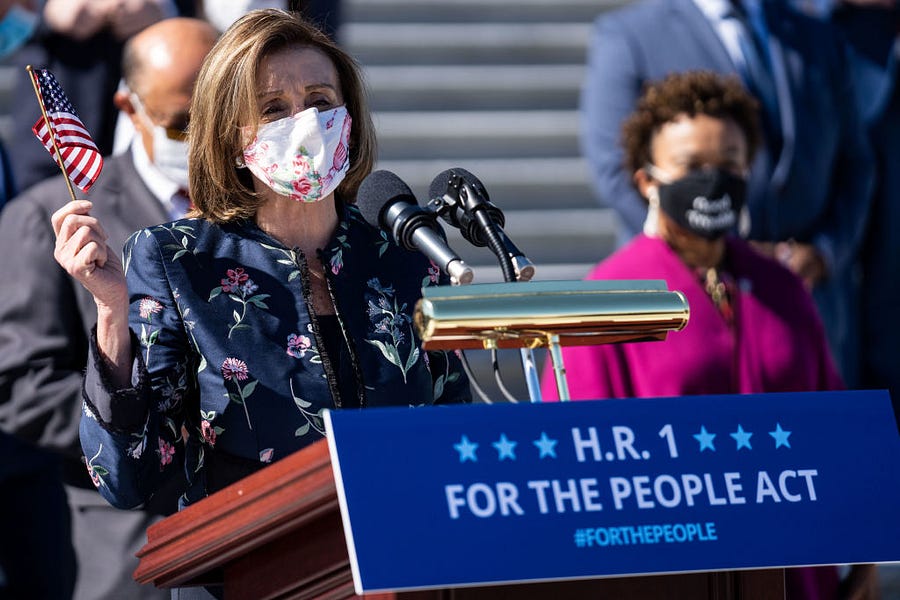If Congress passed a law that put your name and address on the internet because you gave money to a nonprofit, would it scare you? If politicians wrote a law that matched their campaign donations by 600 percent with public money, would you be angry? And if you were forced to fill out a bunch of complicated government forms to promote some Facebook posts about the Biden administration’s school reopening guidelines, would you speak out or remain silent? Congress is trying to enact all this and more right now.
These proposed regulations lurk in the so-called “For the People Act,” (aka H.R. 1 and S. 1), which the House passed without any Republican support last week. It’s been hailed as an expansion of voters’ rights, but its real effect would be to chill political speech.
Under the proposed law, an advocacy group that so much as mentions the name of a member of Congress in an ad about important issues will almost always have to expose its major donors. For example, a group could advocate for or against “Biden’s COVID Recovery Bill” and the new regulations will apply. The donors may not know about the ad and may not even agree with its message. It doesn’t matter. They still will be listed on the group’s government filings and posted on the internet for the world to see.
Naturally, potential donors will hesitate to give to an organization, especially if the group promotes controversial issues. Think about it. The government is requiring nonprofits to create an “enemies list” for their political opponents. And politicians are not bashful about using this kind of information. For example, in 2019, Rep. Joaquin Castro tweeted the names and employers of major Trump donors in his congressional district. Almost immediately, donors were flooded with harassing and threatening phone calls. No one deserves this abuse, regardless of their political beliefs. Political participation should not come with the risk of a mob showing up in your front yard or losing your job as the latest victim of today’s cancel culture.
The consequence of all this will be less speech. Fewer individuals will give to causes they believe in for fear of receiving threats or harassment. Nonprofits will think twice before speaking about the government so they can protect their donors. In a country that prides itself on freedom of political expression, people will be silenced, and organizations will not advocate for their causes.
Equally appalling is how the bill will use public money to feed the campaigns of politicians. All campaign donations to House candidates up to $200 would be matched with six times the amount given. Accordingly, if someone gives a member of Congress $200 for his campaign, then that member will get another $1,200 in matching public financing. This could be available for all 435 members of the House and their opponents. Doling out a few hundred thousand dollars to study the mating habits of cocaine-addicted quail is one thing. But subsidizing politicians to the tune of hundreds of millions annually is madness, especially when those funds could be allocated to other priorities that directly benefit the public.
The authors of H.R. 1 also want to regulate online speech by grassroots groups as if these organizations were candidates or PACs. Now, online political speech is mostly unregulated unless it occurs in the form of paid advertisements. The Federal Election Commission (FEC) adopted this internet exemption rule in 2006 to wide acclaim. It allowed individuals and groups to post content on websites as well as YouTube and other social media platforms. The FEC took this approach so individuals without vast financial resources could create their own political commentary online and actively engage in political debate, instead of just reading the views of the news media.
H.R. 1 will end the exemption and force groups of any size to calculate and report far more of their costs for speaking online. This is likely to include the costs of their tweets and Facebook posts, as well as materials on their own web sites, and more. Just speaking online could trigger the FEC’s existing disclaimer requirements, and communications that cost as little as $250 to produce will require financial reporting. It will be a paperwork nightmare. These new regulations will increase the costs of online political speech and force grassroots groups to risk legal complaints, investigations, and penalties from the FEC if they choose to exercise their First Amendment rights. Until these rules are tested in court, only groups that can afford high-priced lawyers to help them navigate FEC regulations will continue to speak out.
The issues described above, and more, are documented by my organization, the Institute for Free Speech. Now that the House has acted, all attention turns to the Senate, where the text of its version of the bill has not been released. Accordingly, things could get worse. Regardless, it is clear that politicians will always look for new and creative ways to silence their critics. This monster of a bill will serve only to silence speech and diminish our constitutional rights. It should not become law.
Ryan Morrison is an attorney at the Institute for Free Speech in Washington, D.C.






Please note that we at The Dispatch hold ourselves, our work, and our commenters to a higher standard than other places on the internet. We welcome comments that foster genuine debate or discussion—including comments critical of us or our work—but responses that include ad hominem attacks on fellow Dispatch members or are intended to stoke fear and anger may be moderated.
With your membership, you only have the ability to comment on The Morning Dispatch articles. Consider upgrading to join the conversation everywhere.